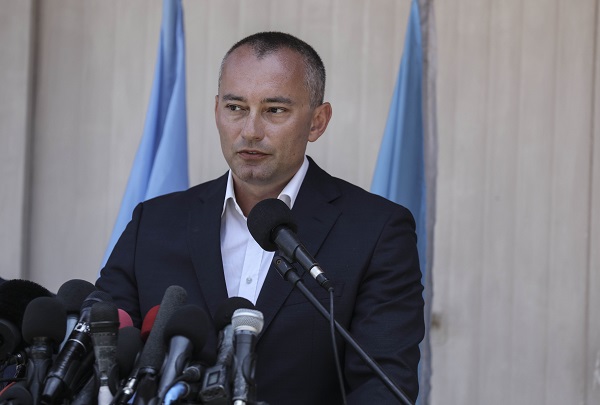United Nations, The UN special coordinator for the Middle East peace process, Nickolay Mladenov has warned that the situation in Gaza remains fragile despite an Egyptian-mediated cessation of hostilities.
“We meet today in the aftermath of the most serious recent escalation between Israel and Palestinian militants in Gaza. Although the immediate crisis was diffused, the situation remains highly volatile,” Mladenov told a monthly Security Council meeting on the Middle East on Wednesday.
Following Israel’s targeted killing of Palestinian Islamic Jihad commander Baha Abu al-Ata in Gaza, Palestinian militants launched more than 500 rockets toward Israel, he said.
While, according to the Israel Defense Forces (IDF), 90 per cent of the rockets were intercepted, those that landed caused damage to residential and commercial property. Up to 78 Israelis were treated for injuries or shock, Xinhua news agency reported.
The indiscriminate launching of rockets and mortars at civilian population centers is unacceptable and must stop immediately, said Mladenov.
In response to the rocket attacks, the IDF conducted a number of strikes against the Palestinian Islamic Jihad and militant targets in Gaza. A total of 34 Palestinians were killed and 109 others injured.
Those killed included eight members of a family, who died in a single Israeli strike. The IDF has reportedly admitted that their home was mistakenly targeted, he said.
“This is a tragic and heinous incident and must be thoroughly and impartially investigated. There is no justification for the killing of civilians anywhere.”
Although the joint efforts of Egypt and the United Nations managed to restore calm in Gaza after 48 hours of hostilities, the dangers have not passed, he warned.
The arrangements that came into effect in the early hours of Thursday are holding, but sporadic rocket launches have continued, prompting Israeli retaliation, he said.
Mladenov commended Egypt for its extraordinary peace effort. “Had our efforts failed, we would certainly be in the midst of another war that would be far worse than the terrible conflict in 2014.”
He warned that there are other risks. Israeli closures and intra-Palestinian division feed a desperate reality. Militant activity, rocket fire, and retaliatory airstrikes constantly risk more violence.
Gaza ultimately requires a political solution, he said. “Militant activity cannot continue to undermine the chances for peace and development. Israel cannot continue with its policy of closures that stifles development. Palestinian leaders cannot continue to avoid the devastating consequences of their internal political division.”
“If we want a way out of this crisis, a way out that leads to something more than yet another cease-fire, the road is clear: stop firing rockets, retaliatory strikes and provocations, uphold the understandings that sustain calm in Gaza, redouble efforts to alleviate the humanitarian crisis and lift the closures, and focus on a long-term, sustainable political solution that includes allowing the Palestinian people across the occupied territory to vote and elect their leaders for the first time since 2006.”
He stressed the importance of upholding the international consensus on resolving the conflict and all final-status issues on the basis of the two-state solution as per relevant UN resolutions, international law and mutual agreements.










